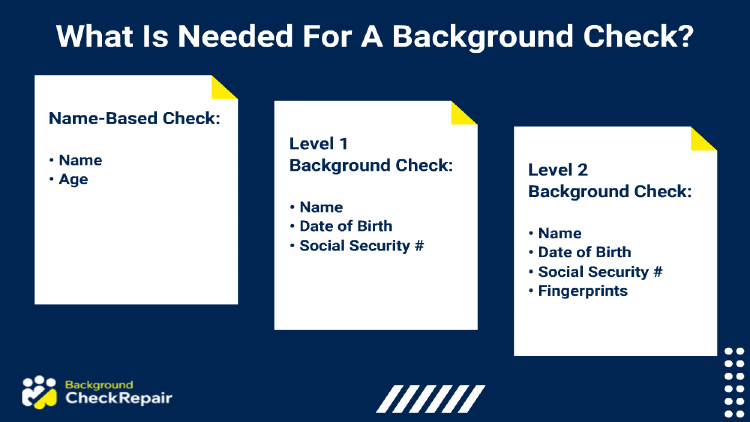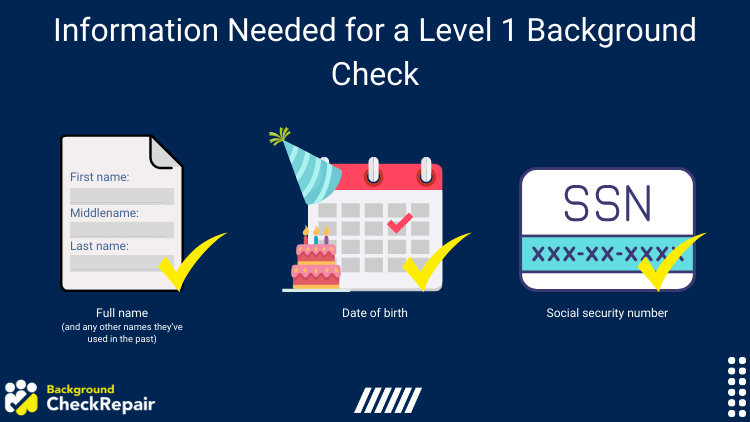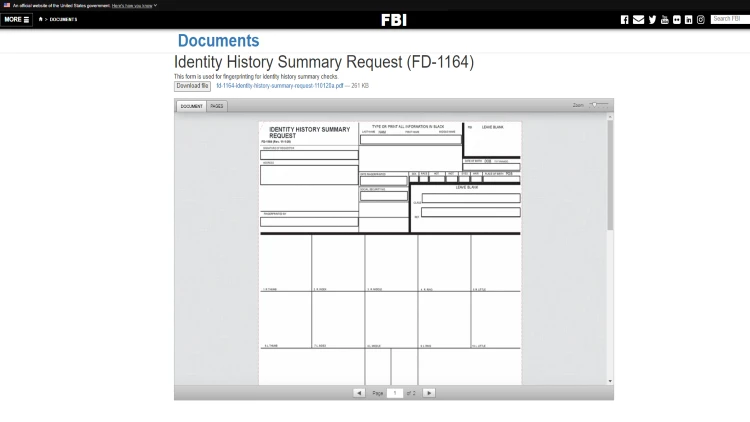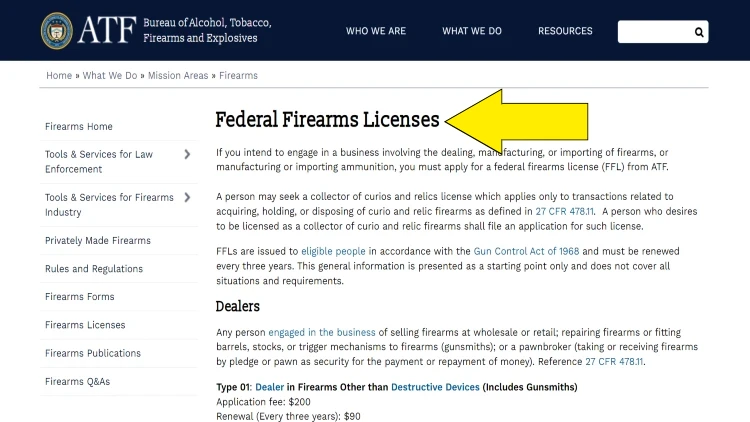We use cookies to ensure that we give you the best experience on our website. If you continue to use this site we will assume that you are happy with it
What Is Needed for a Background Check?
 Written by Background Check Repair
Written by Background Check Repair
Background Checks | May 10, 2024

Table of Contents
What is needed for a background check is probably the most straightforward question when it comes to the hiring process. The answer is the same no matter the reason for the background check, whether it’s for employment, a prospective tenant, or a possible new babysitter.
Making a hiring decision is almost always a very involved process; when looking for new talent, you must make sure that the applicants for a specific job opening are an adequate fit, suitable for the job, and will enrich your company and provide efficient work.
While honesty and openness during an interview are much appreciated, the reality is that you can’t rely solely on them. It is necessary to conduct an extensive research process on every candidate to ensure you’re making the right call.
In case you’re unfamiliar with background checks, they are investigations used to uncover a person’s:
- Credit history
- Employment history
- Criminal background
- Rental history
- Eviction records
- And more (like in the case of an FBI or level 3 check)
Of course, if you’re a recruiter looking to screen prospective applicants for a job, you might not need an individual’s rental history or eviction records; however, if you’re a landlord researching tenants, all the aforementioned will prove to be essential.
Whatever your specific situation may be, it’s of the utmost importance that you understand what is needed for a background check.
Knowing the Basics: What Information Is Needed for a Background Check?
To properly conduct a background check investigation, there are many elements that you must require of the person who’s about to be screened in order to guarantee that you’re getting the most accurate assessment; so, what information is needed for a background check?
Information Needed for a Level 1 Background Check (Local and State Public Records)
The first thing you’ll need to know about your prospective job applicant or tenant is their personal information. This should include, but not necessarily be limited to:
- Full name (and any other names they’ve used in the past).
- Date of birth
- Social security number
While the first two pieces of information will suffice, including a social security number will ensure that all records are applicable only to the intended person for the search.

Having the following isn’t necessary but helps to narrow down the results further if a social security number isn’t available:
- Current zip code
- Phone number
- Email address
- Previous addresses (of the last 7 years) in case investigating other jurisdictions is necessary
- Passport (if the application is for a motor vehicle, employment, or international criminal checks)
Information Needed for a Level 2 Background Check (National Public Records)
A level 2 check will reveal records at the national level, in addition to the local and state level reports that are included in a level 1 check.
The following information is required:
- Social Security Number (to avoid identity mismatches and provide identity verification)
- 10 rolled fingerprint impressions on an FD-1164 form (these are only required for Level 2 background checks)
To be clear, the main difference between a local check and a national-level check that will scan federal databases for criminal records is the requirement for fingerprints.
When fingerprints are required, it’s known as a level 2 background check. These are mandatory if the candidate in question will be dealing with vulnerable populations like children and the elderly.

(Image: Federal Bureau of Investigation4)
The process isn’t complex, but failing to follow the steps correctly can result in delayed or unhelpful results; it’s very important that you follow the following steps to a tee.
- Fill in and submit an Applicant Information Form,5 if the request is for a family, each person must fill out a form.
- Place your fingerprints on an FD-1164 Form.4 Fingerprints must be current (not copies), include DOB, as well as all 10 fingers.
- Pay the required fee with a card or money order (cash and checks will not be accepted).
- Review the documents to ensure they are completed thoroughly without errors.
- Mail them to FBI CJIS Division – Summary Request 1000 Custer Hollow Road Clarksburg, WV 26306
Keep in mind that the process above can be done online as well through a background check provider (also known as a channeler) and results will arrive in less time.
Why Do I Need To Submit a Signed Release?
It is vital that before you run a background check on anyone that you intend to use for hiring decisions or any other professional context, you have a signed release stating their consent regarding the aforementioned process. It is illegal to perform any kind of investigation on a prospective tenant or job applicant without their verbal and written authorization.
If running a name-based background check for personal uses only, then a signed release may not be required, which is why many people use a no-cost criminal records check for personal searches.
Levels: What Info Is Needed for a Background Check by Level Classification?
The nature of the job a person is applying for will determine if they need to be screened under a Level 1 or Level 2 background check.
Level 1 is a name-based check only, while Level 2 is reserved for very specific conditions and situations in which a deeper understanding of a candidate’s information is required. Examples include those working with vulnerable populations or those with access to financial records or bank accounts.
Level 1 Background Check
If the position you’re screening your applicants for does not involve vulnerable groups, technical elements or other aspects that might endanger other people, a Level 1 background screen can be used.
This procedure is very basic and the results come back in a short amount of time. But keep in mind it only researches a person’s criminal records, employment history, and credit report using their name within a statewide database. In other words, criminal records from any other state or county will not show.
Compared to Level 2, this background check is very superficial.
Level 2 Background Check: Criminal History
When a certain job opening involves governmental responsibilities, or caring for vulnerable groups such as children and elderly people, being thorough is vital.
In a nutshell, what is needed for a criminal background check of this nature is the same information needed for a countywide search of a person’s records, which will highlight some concerning crimes such as:
- Kidnapping
- Murder
- Incest
- Manslaughter
- Assault
- Sexual offenses
As opposed to Level 1 investigations, a Level 2 background check will require an individual’s fingerprints, not only their name. These will be run through several criminal and sex offender registries.
Federal (FBI) Background Check Explained
These background checks are the most comprehensive and complex of them all. They’re normally used when a person applies for a high-importance job that could impact the lives of several people. They are also used for those applying to a governmental agency.
While this specific background check can be somewhat similar to a Level 2 process, an FBI check will also include:
- Misdemeanors and felony convictions (explaining the charges, arrests, and convictions)
- Convictions that have been expunged or sealed by a judge
- Any outstanding criminal warrants.
- Charges that didn’t end in conviction
Since these investigations are performed by the FBI, they may take much longer than a standard background check. However, one way to speed up the process significantly is to use a fast-track FBI background screening company.
What Information Is Needed for a Gun Background Check?
Despite new legislation in some states, if you wish to purchase a firearm from a vendor with a FFL (Federal Firearms License),1 you’ll need to pass a background check. Not to worry, though, the process only takes a couple of minutes.

(Image: ATF6)
You may have already undergone this process in the past, but if this is your first purchase, here’s what is needed for a gun background check:
- Fill out Form 4473,2 you’ll be asked for some personal information such as your full name, address, city, state, zip code, county, place and DOB, height, weight, sex, SSN, ethnicity, race, and possibly other points
- Hand over the form to the store clerk
- Wait as your information is checked through the NICS (National Instant Criminal Background Check System)3
- Get your request approved, or denied
If you’re illegally in the U.S., have an addiction, are branded as a fugitive or were dishonorably discharged from the military, you’ll be automatically denied the purchase of a firearm.
What Is Needed for a Criminal Background Check?
While the elements required for a background check have been stated above, you probably still have a lot of questions regarding the duration of a criminal record, and if there’s any chance that time might have a positive impact in terms of erasing previous transgressions.
Criminal History Information: How Far Back Will It Go?
For most U.S. states, 7 years is the maximum period employers are allowed to consider when looking at an individual’s criminal record. There are very few exceptions in which these records can be considered all the way back to a person’s 18th birthday; however, these are not very common.
Keep in mind that an FBI background check will typically include information from all ages, extending past the 7-year window.
Is Your Criminal History Cleared After 7 Years?
The short answer is, no. While most employers can’t consider offenses older than 7 years in a person’s criminal report, these do not simply disappear.
Sadly, a criminal record is permanent, and whatever offenses or encounters with the law you might have had will always show up when an investigation is conducted.
What Does a Background Check Reveal, Will It Show Grade School Permanent Records?
What a background check reveals is of prime concern for both the subject of the report and the one running it.
Background checks come in many forms and can include information outside of the typical results of employment verification and criminal records.
The following may also be included:
- SSN verification
- Credit report
- Work authorization
- Education history (some severe offenses like suspensions can go on a student’s permanent record and show up during background checks)
- Driving records
How Long Does a Background Check Take?
Depending on the type of investigation you’re conducting, these processes can take between 1-3 days, all the way up to several months. Naturally, simpler searches will take less time than more complex ones. The times you can expect to wait before getting results for each type of research process are:
- Level 1: 1-3 days or less.
- Level 2: 3-7 days.
- FBI Background Check: 12-14 weeks (unless done through an FBI-approved channeler. If you choose this option, the process could be significantly reduced and take up to 10 days).
You can learn more about the full timeline by reviewing the guide on the time required for background checks to be completed.
What Do You Need for a Background Check To Be Approved?
As stated above, in order to have a background check approved, you must remain in compliance with your state and local laws. Remember to always get consent from whomever you’re screening before beginning any kind of process.
The guidelines and steps to follow discussed in this article will serve as a starting point to go about this; however, you should always be sure to ask the involved organizations if you have any other specific doubts or special cases.
References
1Bureau of Alcohol, Tobacco, Firearms and Explosives. (2023, June 27). Federal Firearms Licenses. ATF.gov. Retrieved May 2, 2024, from <https://www.atf.gov/firearms/federal-firearms-licenses>
2Bureau of Alcohol, Tobacco, Firearms and Explosives. (2024). Firearms Transaction Record. ATF.gov. Retrieved May 2, 2024, from <https://www.atf.gov/firearms/docs/4473-part-1-firearms-transaction-record-over-counter-atf-form-53009/download>
3Federal Bureau of Investigation. (2024). About NICS. FBI. Retrieved May 2, 2024, from <https://www.fbi.gov/how-we-can-help-you/more-fbi-services-and-information/nics/about-nics>
4Federal Bureau of Investigation. (2024). Identity History Summary Request (FD-1164). FBI. Retrieved May 2, 2024, from <https://www.fbi.gov/file-repository/fd-1164-identity-history-summary-request-110120.pdf/view>
5Federal Bureau of Investigation. (2024). Identity History Summary Request Form. FBI. Retrieved May 2, 2024, from <https://forms.fbi.gov/identity-history-summary-checks-review/q384893984839334.pdfa>
6ATF. (2023, June 27). Federal Firearms Licenses | Bureau of Alcohol, Tobacco, Firearms and Explosives. ATF. Retrieved May 11, 2024, from <https://www.atf.gov/firearms/federal-firearms-licenses>
